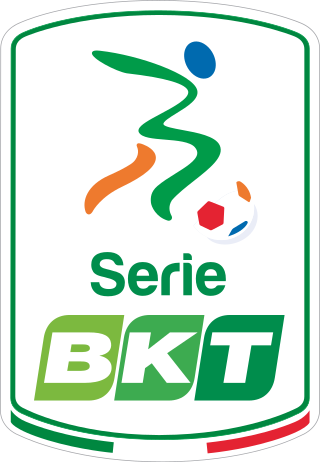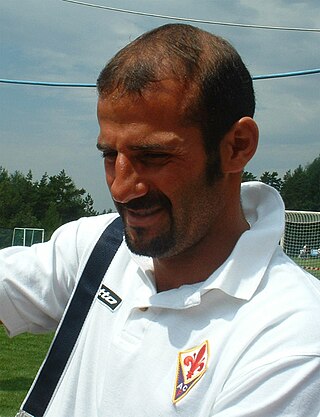Related Research Articles

The Serie B, officially known as Serie BKT for sponsorship reasons, is the second-highest division in the Italian football league system after the Serie A. It has been operating for over ninety years since the 1929–30 season. It had been organized by Lega Calcio until 2010 and the Lega Serie B ever since. Common nicknames for the league are campionato cadetto and cadetteria, since cadetto is the Italian name for junior or cadet.

Giuseppe Pancaro is a former Italian football defender turned coach.
Benito Carbone is an Italian football manager and former professional player. Since August 2024, he is the head coach of Inter Milan's under-18 side.
Federico Giunti is an Italian former footballer turned manager, who played as a midfielder in the role of deep-lying playmaker. He was most recently the current manager of Milan Primavera.
Corrado Mario Colombo is an Italian former footballer who played as a striker.
Massimo Brambilla is an Italian professional football coach and former player, currently in charge of Serie C Group C club Juventus Next Gen. As a player, he played as an attacking midfielder.

Luigi "Gigi" Radice was an Italian football manager and player.

Marco Ferrante is an Italian former professional footballer who played as a forward. With 125 total goals scored for Torino, he is the fifth-highest scorer in the history of the Torinese club behind Guglielmo Gabetto (127) and ahead of Valentino Mazzola (123).

Angelo Anquilletti was an Italian football defender. A tough yet fair player, Anquiletti was a successful right-sided full-back, who was known for his strength, energy, work-rate, positioning, marking ability, anticipation, and his ability to read the game; he also excelled in the air and was confident on the ball and at distributing it to teammates, which also enabled him to be deployed as a sweeper towards the end of his career. He is mostly remembered for his lengthy spell with AC Milan and for being a member of the Italian UEFA Euro 1968 winning squad. Anquiletti was known by the fans as "Angelo Anguilla", due to his man-marking ability, and wore the number 2 shirt throughout his successful Milan career.
Angelo Colombo is an Italian former footballer who played for Milan as a midfielder, and was part of their European Cup victories in 1989 and 1990. He is now a scout for the club.
Amedeo Mangone is an Italian football coach and former player, who played as a defender.
Angelo Pagotto is an Italian former footballer who played as a goalkeeper.
Salvatore Fresi is an Italian former professional footballer who played as a centre-back or sweeper.
Roberto Galia is an Italian professional football coach and a former player, who played as a defender and as a midfielder.
Massimiliano Cappellini is a retired Italian professional footballer who played as a forward.
Antonio Donnarumma is an Italian professional footballer who plays as a goalkeeper for Serie A club Torino.
Luca Tremolada is an Italian footballer who plays as a midfielder for Serie C Group B club Ascoli on loan from Modena.
Piacenza Calcio managed to secure a penultimate-round survival in their second attempt to establish themselves in Serie A. Much thanks to the presence of 14-times goal scorer Nicola Caccia and creative midfielder Gianpietro Piovani, plus a tight defensive line, Piacenza had five points in hand to the relegated Bari.
Fabio Eguelfi is an Italian footballer who plays as a defender.
Riccardo Forte is an Italian footballer who plays as a forward for Serie C Group B club Campobasso.
References
- 1 2 3 4 5 "Angelo Carbone". magliarossonera.it (in Italian). Retrieved 15 April 2015.
- ↑ Salvio Passante (15 April 2010). "Carbone a Tutto Napoli: "Europa, si può. Barreto? No, Pocho"". tuttomercatoweb.com (in Italian). Retrieved 15 April 2015.
- 1 2 "LA ROSA BIANCOROSSA NEL CAMPIONATO 1995/1996". storiapiacenza1919.it (in Italian). Retrieved 15 April 2015.
- ↑ Franco Melli; Vanni Zagnoli (5 February 1996). "Dieci minuti di follia e l' Inter va a picco". corriere.it (in Italian). Il Corriere della Sera. Retrieved 15 April 2015.
- ↑ "CALCIO NEWS". repubblica.it (in Italian). La Repubblica. 25 October 1996. Retrieved 15 April 2015.
- 1 2 "La Pro Patria silenziosa va a Sassuolo in cerca di riscatto". varesenews.it (in Italian). 25 November 2006. Retrieved 15 April 2015.
- ↑ "Dal Piacenza alla Nazionale…". storiapiacenza1919.it (in Italian). Retrieved 15 April 2015.
- ↑ "LE PARTITE NON VALIDE E QUELLE NON UFFICIALI DISPUTATE DALLA NAZIONALE". italia1910.com (in Italian). Retrieved 15 April 2015.
- ↑ "Nazionale in cifre: Angelo Carbone". figc.it (in Italian). FIGC. Archived from the original on 16 April 2015. Retrieved 15 April 2015.
- ↑ Bruno Galvan (29 June 2011). "Angelo Carbone: "Confermo la trattativa per Marek, ma non è così facile"". calcionapoli24.it (in Italian). Retrieved 15 April 2015.